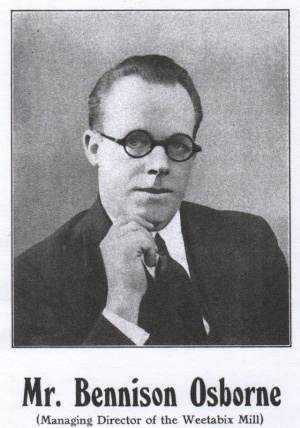Weetabix: Difference between revisions
Amwelladmin (talk | contribs) (Created page with "thumb|[[Bennison Osborne yesterday. Well, in 1936, anyway.]] Weetabix is the softer, more elegant, but derivative version of Wee...") |
Amwelladmin (talk | contribs) No edit summary |
||
| (4 intermediate revisions by the same user not shown) | |||
| Line 1: | Line 1: | ||
[[File:B-osborne-weetabix-1936.jpg|thumb|[[Bennison Osborne]] yesterday. Well, in 1936, anyway.]] | [[File:B-osborne-weetabix-1936.jpg|thumb|[[Bennison Osborne]] yesterday. Well, in 1936, anyway.]] | ||
[[Weetabix]] is the softer, more elegant, but [[derivative]] version of [[Weet-bix]], invented by Australian grain impresario [[Bennison Osborne]], with marketing assistance from Osborne’s New Zealand pal Malcolm | From the “it would make a good [[Otto Büchstein]] operetta” file, [[Weetabix]] is the softer, more elegant, but ultimately [[derivative]] version of [[Weet-bix]], the dowdy breakfast cereal invented by Australian grain impresario [[Bennison Osborne]], with marketing assistance from Osborne’s New Zealand pal Malcolm MacFarlane. Originally conceived as a superior and more edible biscuit than Sanitarium Health Foods Company’s “Granose” biscuit, [[Weet-bix]] was manufactured and distributed throughout Australasia by Grain Products Limited, an undertaking owned by one Arthur Shannon. | ||
In 1930 Shannon, to Osborne’s tremendous chagrin, sold his company to Sanitarium. Not to be outdone, Osborne and | In 1930 Shannon, to Osborne’s tremendous chagrin, sold his company to Sanitarium. Not to be outdone, Osborne and MacFarlane relocated to South Africa, where Osborne modified his Weet-Bix recipe<ref>A slightly finer grain, and oblong, rather than rectangular, “biscuits”. But, you know, still fundamentally dowdy.</ref> and — again with financial assistance from Shannon — founded a new company, [[The British and African Cereal Company Limited]]. They named the new company's product, ''[[Weetabix]]''. The company commenced business in England in 1932 in an unused gristmill near Kettering. | ||
The rest, as they say is history. | The rest, as they say is history. | ||
{{sa}} | |||
*[[Otto Büchstein]] | |||
{{ref}} | {{ref}} | ||
Latest revision as of 11:36, 18 January 2020

From the “it would make a good Otto Büchstein operetta” file, Weetabix is the softer, more elegant, but ultimately derivative version of Weet-bix, the dowdy breakfast cereal invented by Australian grain impresario Bennison Osborne, with marketing assistance from Osborne’s New Zealand pal Malcolm MacFarlane. Originally conceived as a superior and more edible biscuit than Sanitarium Health Foods Company’s “Granose” biscuit, Weet-bix was manufactured and distributed throughout Australasia by Grain Products Limited, an undertaking owned by one Arthur Shannon.
In 1930 Shannon, to Osborne’s tremendous chagrin, sold his company to Sanitarium. Not to be outdone, Osborne and MacFarlane relocated to South Africa, where Osborne modified his Weet-Bix recipe[1] and — again with financial assistance from Shannon — founded a new company, The British and African Cereal Company Limited. They named the new company's product, Weetabix. The company commenced business in England in 1932 in an unused gristmill near Kettering.
The rest, as they say is history.
See also
References
- ↑ A slightly finer grain, and oblong, rather than rectangular, “biscuits”. But, you know, still fundamentally dowdy.